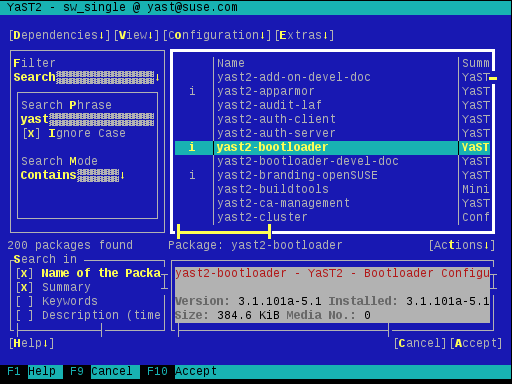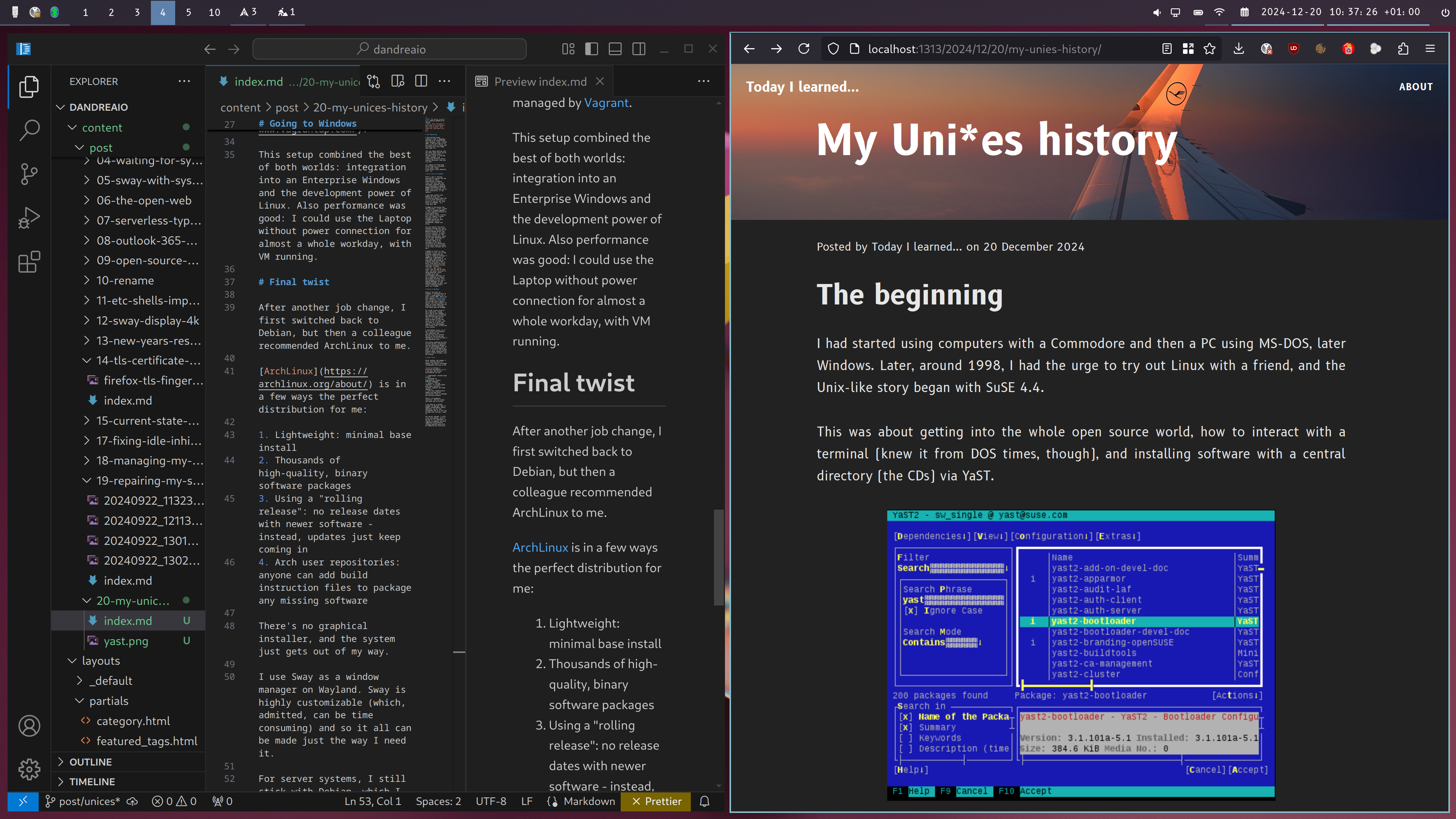Over the years I have used a few different Unix-like systems. What stood out, and where am I now.
The beginning
I had started using computers with a Commodore and then a PC using MS-DOS, later Windows. Later, around 1998, I had the urge to try out Linux with a friend, and the Unix-like story began with SuSE 4.4.
This was about getting into the whole open source world, how to interact with a terminal (knew it from DOS times, though), and installing software with a central directory (the CDs) via YaST.

YaST on a terminal - as it looks today
From Linux to FreeBSD
After a year I started working at a german ISP and they had all their workstations on Debian Linux, but also they had enormeous internet access, so I downloaded a whopping 650MB installation CD from RedHat and tried that out at home. Eventually, it led nowhere.
I had some contact with Debian at work, but influential people there saw it as a plain necessity of policy to use it, but they swore on FreeBSD - so I tried that one. It must have been FreeBSD 6.0 back then.
FreeBSD is the kernel and the userland - a full system - that is shipped together, in that regards different to Linux where every distribution ships a kernel, but will supply a custom userland to users. In FreeBSD things are more streamlined, better documented, change less often.
You can install 3rd party software through the ports collection, a collection of Makefile-based build- and install-routines. It means you will compile all the software by yourself, which can be time consuming and error prone. Also all software needs to be included to the ports collection by a maintainer (from which there are many), so not every software has a port.
FreeBSD in itself is very pleasant to use, but it had problems supporting the range of required software I needed as a developer at that time. Specifically, we used PHP with myriads of C-based extensions. PHP is built from source by first creating configure-scripts with the automake, autoconf and bison tools, and for PHP at that time, the exact versions of these mattered. Since FreeBSD ports had not-suitable versions, it was a headache to compile up-to-date versions. Also the database at work was a Sybase database (in the meantime bought by SAP), and client libraries didn’t exist for FreeBSD.
Going to Windows
After a few years on FreeBSD, I switched back to Linux. I used Gentoo for 2 years around 2006, where you also compile everyting. Very versatile, since also can include every compile option, but also complex. At least on Linux there were no hardware driver problems like there were on FreeBSD.
At a time I grew tired of the complexity, though. Also, due to job changes, I was expected to use Outlook and the Microsoft office suite - so I decided it would be best to use the setup by our IT there, and use Linux in a VM on the laptop. Since development left focus a bit, so did the Linux system.
I used Debian Linux, as it was a binary distribution (no compiling) and more-or-less just worked. The VM on the system was managed by Vagrant.
This setup combined the best of both worlds: integration into an Enterprise Windows and the development power of Linux. Also performance was good: I could use the Laptop without power connection for almost a whole workday, with VM running.
Final twist
After another job change, I first switched back to Debian, but then a colleague recommended Arch Linux to me.
Arch Linux is in a few ways the perfect distribution for me:
- Lightweight: minimal base install
- Thousands of high-quality, binary software packages
- Using a “rolling release”: no release dates with newer software - instead, updates just keep coming in
- Arch user repositories: anyone can add build instruction files to package any missing software
There’s no graphical installer, and the system just gets out of my way.
I use Sway as a window manager on Wayland. Sway is highly customizable (which, admitted, can be time consuming) and so it all can be made just the way I need it.
For server systems, I still stick with Debian, which I do due to its robustness in regards to updates and more supported architectures (though aarch64 would also be supported by Archlinux).


